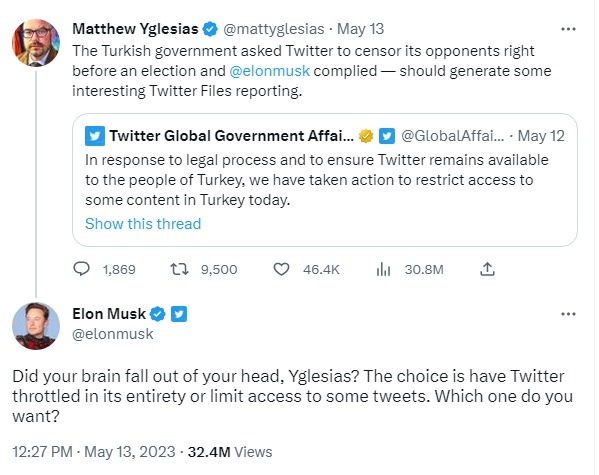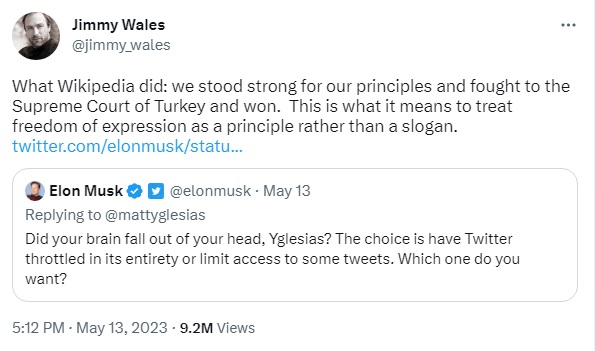[Previous: You’d be a better billionaire than Elon Musk]
As far as I know, OnlySky hasn’t been blocked by any country in the world. But if it was, I’d consider it a badge of honor.
When he bought Twitter, Elon Musk famously bragged that he was a free speech absolutist. That turned out to be a blatant lie. Far from being a defender of free speech, Musk has been on the side of the censors. He’s made a habit of banning journalists who report unfavorably on him, or who cover stories he doesn’t want covered, and then retroactively making up new rules they violated.
However, a billionaire lashing out over insults to his fragile ego is just garden-variety pettiness and hypocrisy. More worrisome still is Twitter’s complicity in government censorship—demands to block posts critical of a government figure, as well as identifying the users responsible for them.
Twitter’s own data shows that since Musk took over, he’s given in to every single one of these requests. Unlike the previous management, he hasn’t resisted even once:
The data, drawn from Twitter’s reports to the Lumen database, shows that between October 27, 2022 and April 26, 2023, Twitter received a total of 971 requests from governments and courts. These requests included orders to remove controversial posts, as well as demands that Twitter produce private data to identify anonymous accounts. Twitter reported that it fully complied in 808 of those requests, and partially complied in 154 other cases. (For nine requests, it did not report any specific response.)
Most alarmingly, Twitter’s self-reports do not show a single request in which the company refused to comply, as it had done several times before the Musk takeover.
…More broadly, the figures show a steep increase in the portion of requests that Twitter complies with in full. In the year before Musk’s acquisition, the figure had hovered around 50%, in line with the compliance rate reported in the company’s final transparency report. After Musk’s takeover, the number jumps to 83%…
In India, Musk’s Twitter has censored a BBC documentary critical of Prime Minister Narendra Modi, as well as blocking over a hundred accounts belonging to opposition figures, activists and journalists.
Most recently, on the eve of an election in Turkey, Twitter obeyed an order from the Turkish government to block certain (unspecified) accounts. Twitter didn’t say what content had been restricted, but according to local reports, the censorship encompassed journalists and opposition figures who’ve been critical of Erdogan’s rule.
When people pointed out the irony of this, Musk got huffy and defensive:

With this admission, he’s given every authoritarian government a blueprint for how to censor Twitter. If they threaten to block the entire site from their country, Elon “Free Speech Absolutist” Musk will do anything they want.
By contrast, here’s what an actual principled stand for free speech looks like, as related by Wikipedia founder Jimmy Wales:

The context for this is that, in 2017, the Turkish government ordered Wikipedia to remove content that described Turkey as a sponsor of Islamist groups. They refused, and as a result, Wikipedia was blocked in Turkey for three years. But they didn’t give in, and ultimately a Turkish court ruled in Wikipedia’s favor and ordered the block to be lifted.
In another example of their principled commitment to free speech, Wikipedia has spoken out against the United Kingdom’s proposed “Online Safety Bill” which, among other things, would require a huge swath of websites to verify the age of their users.
The Wikimedia Foundation says it would be impossible for them to comply with such a sweeping request. Even if they could, it would go against their commitment to respect the privacy of their readers and contributors. If the bill becomes law, they warn, they’ll withdraw from the U.K. rather than comply.
As one of the richest men in the world, Elon Musk could take a similar stand, if he chose. He could announce that he won’t censor Twitter at the behest of any national ruler, and that if any country blocks Twitter as a result, he’ll accept that as the cost of free speech. He could be setting a global example.
But it’s clear that, whatever rhetoric he throws out for public consumption, profit will always be his top motive. Musk has business ties with Turkey, and it’s fair to ask whether this influenced his decision to bow to Erdogan’s will.
There’s no such thing as a free speech absolutist
It should have been obvious from the beginning that Musk’s claims were mere puffery, because in reality, there’s no such thing as a free speech absolutist.
By the literal definition of the term, a free speech absolutist would be a person who thinks there should be no legal restrictions on any speech—including fraud, defamation, death threats, images of child sexual abuse, or posting bomb-making directions. Obviously, no serious person believes this. It’s generally agreed that we can and should punish speech that’s harmful in these ways.
Everyone lies somewhere on a spectrum of opinion about what kinds of speech should be allowed and what should be forbidden. Even free democracies disagree about this. Many Western countries have hate-speech laws, whereas the United States allows hateful or bigoted speech if it’s not attached to something that’s a crime in its own right.
There are also varying opinions about whether lies deserve the same protection as truth—and if not, who gets to decide what counts as a lie and what’s truthful. Laws against false advertising would be an example of that.
All the way on the other end of the spectrum, there are countries that outlaw criticism of the rulers (like China’s Great Firewall or Thailand’s lèse-majesté law) or censor speech that offends religious believers (like blasphemy laws in Islamic nations). The purpose of these laws isn’t to prevent harm, but to prevent change. They’re intended to keep society fixed as it is, and to prevent the spread of information that could undermine the power of those who currently possess it.
These laws are the antithesis of free speech. They only allow speech that serves the interests of the dominant class. To that list, you could add the rash of book censorship, Don’t Say Gay and anti-drag laws in U.S. red states. Although the U.S. has historically been a haven of free speech, some religious conservatives want to undo that. Like royalists and imams and Chinese autocrats, they want to enshrine their own opinions as law so they can hold on to power forever.
This is the acid test of whether someone truly supports free speech. What’s their attitude toward speech that angers or embarrasses the powerful, or that makes them look corrupt or incompetent? That’s the highest and most vital purpose that free speech serves, and the reason that we treat it as a human right. If that isn’t allowed, everything else is irrelevant.